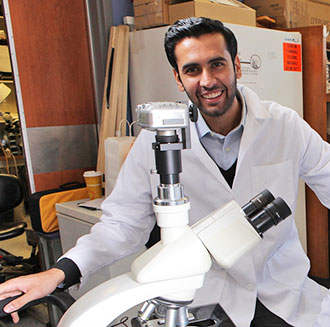
Ranjodh Singh, Weill Cornell Medical College Class of 2017, has been awarded a 2015 Carolyn L. Kuckein Student Research Fellowship by Alpha Omega Alpha, the national medical honor society. The $5,000 award will allow Singh to spend part of his upcoming academic year continuing the research initiative he began last year thanks to his 2014 fellowship from the Pharmaceutical Research and Manufacturers of America Foundation (PhRMA Foundation).
Singh’s research project, "Molecularly-Defined Combinatorial Targeted Therapy in a Diffuse Intrinsic Pontine Glioma Mouse Model Using Convection-Enhanced Delivery," which he is conducting under the mentorship of Dr. Mark Souweidane, may provide the basis for a continuation and expansion of Dr. Souweidane’s clinical trial testing convection-enhanced delivery (CED) of a therapeutic agent to fight diffuse intrinsic pontine glioma (DIPG). DIPG is a uniformly fatal brainstem tumor that usually strikes children under the age of 10. (Read more about the clinical trial.)
The current clinical trial, now in its third year, is testing the safety of delivering a single agent, 124I-8H9, directly to the tumor site using a surgically placed infusion cannula. Singh’s research is investigating the potential effectiveness of using a combination of three potential agents delivered to the tumor site via CED. These three agents may work better in combination against three elements recently identified as being hallmarks of up to half of all cases of DIPG: platelet derived growth factor receptor (PDGFR), protein kinase B (AKT), and mammalian target of rapamycin (mTOR). Singh is testing the three agents — dasatinib (a PDGFR inhibitor), perifosine (an AKT inhibitor) and everolimus (an mTOR inhibitor) — in various combinations in a DIPG mouse model. He hopes the data resulting from his investigation will help Dr. Souweidane develop the next stage of his clinical trial of CED.
Singh has been working in Dr. Souweidane’s lab since his first year of medical school. He will graduate with his MD degree in 2017.
DIPG is one of the deadly brain tumors being studied in the Weill Cornell laboratories of the Children's Brain Tumor Project. More about the CBTP.